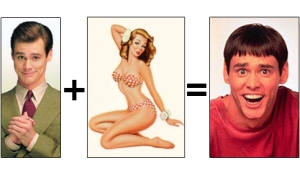I’ve often pointed out that if our clothing has an effect on other people, that’s their problem, not ours. I suppose it’s time to science this matter: how can our clothes affect other people?
There are a few brave souls out there who’ve experimented with changing their look and documenting reactions for our edification: for example, trying out goth, vintage and natural looks; or varying levels of makeup on a dating website. While these articles are often quite entertaining and insightful, they suffer from the problem “N=1”; they’re just one-off stories and it’s probably a bad idea to generalise from them, no matter how much we might want to agree with them. The same goes for the ‘common-sense’ ideas about the messages other people pick up in our clothes. As a general rule of thumb, common sense ain’t so common (or sensible, for that matter).
There are a couple of findings I kinda liked:
1) Winners wear red
In a study of Olympic combat events (Hill & Barton, 2005), 55% of bouts won by competitors in red. Okay, but maybe those competitors just happened to be better fighters? Another study of Taekwondo bouts (Hagemann et al, 2008) used clips of matches in which the competitors wore blue or red. These clips were shown to 42 referees who would award points. Sneakily, the same clips were shown again, but with the colours digitally swapped over. It turned out that on average, fighters in red were awarded 13% more points than those in blue.
So, it looks like there’s some evidence that the colour of our clothes can affect how other people react to us. Just bear in mind that these studies were in a purely sporting context, and there’s nothing to suggest whether these are innate or biological reactions, or based on cultural cues. And there’s more to winning than simply wearing red (just ask Charlie Sheen).
2) Sexiness is distracting for about half of us
A study on decision-making and bargaining (Wilson & Daly, 2004) presented (presumably heterosexual) male and female participants with pictures of attractive or plain people of the opposite sex and asked them to rate their attractiveness. Then they would take part in a exercise in which they’d have to divide up sums of money and judge whether to take a small, immediate reward or a larger reward later.
They found that, generally speaking, women weren’t really affected by the pictures of attractive men and didn’t make poorer choices. However, pictures of attractive women made men perform worse (compared with neutral pictures). The effect is more pronounced in men with higher testosterone levels.
Conclusion?
Even if the way we look affects other people (and remember, these can be very subtle effects in very specific situations), I don’t think this is any reason to dictate what we can wear. I don’t think any of this has any impact on the principle that if someone else is distracted or made uncomfortable by what they see, that’s their problem not ours…




